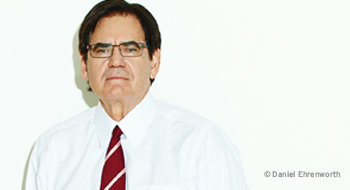
OMERS president and CEO Michael Nobrega—who will be retiring at the end of this month—talks about his time with the pension fund
>> Why did you decide to go into the pension and investment industry?
I was always in the industry. I became a chartered accountant, and I stayed in the profession until I became a partner. I was a tax partner for a number of years at Arthur Andersen. And, as such, I was involved in numerous mergers and acquisitions, so I had a lot of broad experience in the investment community. I landed at OMERS in 1998 to launch OMERS’ entry into infrastructure through Borealis Infrastructure.
>> What was it like launching Borealis?
It was very difficult—extremely difficult—to kick-start this asset class. In many respects, we had to create interest and develop the market. We had to be proactive with potential sellers and get an interest in investments so they could begin to fully understand the potential of the assets they held.
>> How has OMERS changed since you joined in 1998?
At that time, OMERS was essentially a passive investor. We were basically a small Canadian pension fund operating in the province of Ontario and relying on external managers to provide our investments. Today, we are a fully integrated professional organization, both in terms of investments and pension administration.
>> What makes OMERS different from other pension funds?
We have been innovative as an organization. We’ve developed OMERS investment management products that will be available to other smaller pension funds because we’re collaborative by nature. We’ve developed what we call the additional voluntary contributions program, which is commingled with our DB plans but is a separate account for our plan members. We have also been the only pension fund that established a small foothold in the venture capital space.
>> Are there any new markets that OMERS plans to enter?
We have not entered the Asian market. We have a New York office and a London office, and Borealis Infrastructure just landed a small team in Australia. We haven’t entered places such as China, India and emerging economies in Latin America. That doesn’t mean we don’t have exposure to them; we would have exposure through our capital markets, basically in liquid securities.
>> What would you say was your greatest accomplishment at OMERS?
I never see it as my accomplishment; I always see it as a team accomplishment. No organization this size is run by one person—it’s always a team effort. I would say that the measure of my success is that, for six consecutive years, we have been recognized as a Top 50 employer in Canada. And I think the second one is our willingness to be innovative and use our available intellect and the scope of our existing legislation to provide the means to expand retirement coverage for people. We’ve received a lot of recognition by the pension industry for pushing the agenda in the retirement landscape.
>> What advice do you have for your successor, Michael Latimer?
Michael has been with me for a long time—we have worked together for the last 10 years. We have, together with other OMERS team members, built what we have today. Our strategic plan pillars, now that they are all in place, have set us on a course to be very successful over the next 10 years. My expectation is that he will continue to build upon our success.
>> What are your plans for retirement?
That’s a topic that I shall think about after April 1, 2014. At the moment, I owe a responsibility to myself, to the team, to the plan members, to the stakeholders, to the sponsors and to the business community to complete this job responsibly and professionally—and without distraction.
Craig Sebastiano is associate editor of BenefitsCanada.com
Get a PDF of this article.
